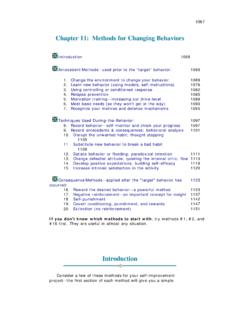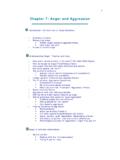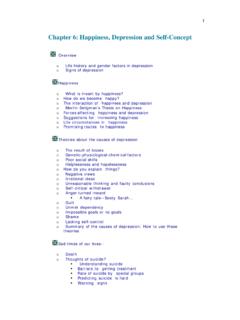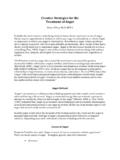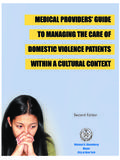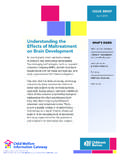Transcription of Methods for Gaining Insight into Ourselves
1 1491 Chapter 15: Methods for Gaining Insight into Ourselves Page Introduction to Insight 1492 1. Becoming open-minded: to consider the possibility that 1496 all sorts of motives and traits are true of you 2. Self-awareness: to learn Gestalt techniques for Insight 1504 a. Your focus of awareness 1506 b. Looking for the opposites 1508 c. Empty chair technique 1510 d. I'm responsible for my choices 1512 e. Dealing with unfinished business 1513 3. Self-understanding to undertake an extensive self-study 1515 a. Autobiography 1518 b. Diary or intensive journal 1522 c. Psychological readings 1528 d. Use what you have learned; avoid creating false memories 1534 4.
2 Recognize unconscious forces: to see the continuing influence of 1536 your childhood. a. Your inner child of the past 1538 b. Life scripts 1539 c. Your life position 1540 d. Games we play 1542 e. Changing your life script 1547 f. Myth analysis 1550 g. Self-help Methods for finding your myths 1553 5. Self-analysis: to probe for insights 1561 a. Psychological testing; online testing 1561 b. Projective techniques 1566 c. Guided fantasies 1567 d. Feedback from others 1570 e. Reframing 1571 f. Let the body talk (Focusing) 1572 g. Free association and word association 1576 h. Catharsis and abreaction 1577 i. Early memories 1578 j. Other Methods 1580 6.
3 Dream analysis: uncover concerns and needs by studying dreams 1582 1492 a. Looking for possible meaning 1588 b. Using insights from dreams 1594 Introduction to Insight If there are unconscious motives, urges, feelings, defenses, and thoughts inside of us, or if parts of our brain carry out mental processes we are unaware of, it seems reasonable that knowing about those forces would improve our chances of controlling and directing our lives. There is so much we do not understand about Ourselves and others, partly because we just don't know the laws that determine behavior and maybe partly because we are unconscious of what's going on. Perhaps it was no accident that the first psychotherapy--psychoanalysis--strove to uncover "the unconscious.
4 " That was 100 years ago. Today, everyone is to some extent a Freudian psychoanalyst. We all psychologize about what makes people tick. We look for the true (often hidden) motives of a new date, a salesman, a politician, an employer, and others. Once we become aware of defense mechanisms and repression, we even wonder about our own unconscious perceptions, needs, thoughts, and intentions. The notion of unconscious processes constantly being at work in all of us has been well ingrained in our culture for several decades. Now, even the new brain research supports the idea that many parts of our brains can be doing things without our conscious "self" being aware of what's going on (see The Mind series on PBS). Man's mind stretched to a new idea never goes back to its original dimensions.
5 -Oliver Wendell Holmes As additional Methods of psychotherapy came along--Client Centered, Psychodynamic, Gestalt, Transactional Analysis, Interpersonal--the Methods changed but the purpose for all these therapies remained the same, namely, to gain Insight , to understand our mind and emotions better. Only during the 60's and 70's did the Behavior Modification and Behavior Therapy approaches disregard the unconscious. More recently, with the resurgence of Cognitive and Cognitive-Behavioral techniques, the unconscious is back but in a different form. The Cognitive therapists recognize that the distortions of our perception and thinking are often unconsciously self-serving, but they do not speculate a lot about evil repressed motives.
6 As long as the unconscious is there in any form, some of us will feel a need to explore it. 1493 As you may know, Insight -oriented therapists say that self-analysis is very important for a therapist, even essential. Freud devoted the last hour of every day to understanding himself. The truth is, however, that most psychoanalysts and other therapists become introspective only when they are having personal problems (Goldberg, 1993). Furthermore, even when stressed, their self- Insight efforts tend to be superficial. My point is: the professionals, who are taught it is important, haven't invested much time and effort into self-analysis. Why not? Maybe it is too uncomfortable to probe into one's real, honest motives, or maybe we just don't have the techniques or Methods for making self-analysis fruitful, or both.
7 Goldberg, a psychiatrist, believes that we humans universally avoid thinking deeply about Ourselves because that process would soon reveal how little we know, how limited and fragile our relationships are, how little control we have over life, how ashamed we are of Ourselves , how constantly vulnerable we are to pain and death, etc. Thus, we subtly resist getting to know Ourselves --preferring to have our illusions that "everything will magically work out." Unfortunately, seeking the comfort of denial and ignorance makes it unlikely that we will cope well and self-improve in any of these areas that we prefer not to face. Every one of us faces this predicament ( , self-study or self-avoidance) right now. I urge you to learn as much as you can about yourself and others.
8 Relationships with people will be the most important part of your life. Be an expert, starting with yourself. All men should try to learn before they die what they are running from, and to, and why. -James Thurber Insight oriented therapies, like all therapies, make assumptions about human nature. Based on what theorists think they have found in clients' minds, naturally they suggest that is what you should find when you self-explore. Psychoanalysts believe unconscious selfish, hostile, destructive, infantile, sexual, and love needs dominate our unconscious and drive our behavior. Humanists and client-centered therapists believe that safety, self-acceptance, and needs for love, friends, ideals, and self-actualization drive us.
9 If you accept the psychoanalytic view, you must remain constantly alert to the sinister and animalistic motives that lurk inside all of must tame the beast within. If you accept the humanistic view, you only have to avoid neurotic barriers to achieving your basic needs to be good. The neurotic needs prevent you from automatically blossoming into a caring, mature, self-actualized person. I personally assume that both selfish-evil impulses and stressful neurotic thoughts are sometimes shoved out of our awareness and into our unconscious where they still have influence. I suspect both mean-selfish-angry impulses (mostly 1494 out of awareness) and good-caring-achieving drives (mostly in our awareness) are constantly competing for expression in all of us.
10 Regardless of whether our basic nature is good or evil, it is obvious that many cognitive processes occur without our awareness, our unique perception of the situation, our specific memories brought to mind by the circumstances, our idiosyncratic explanation of events and feelings about them, etc. We are not able to perceive how mental events (our perception, learning, memory) occur--but not knowing how our mind works isn't the same as being unaware of our hostility that everyone else can sense. Also, a distinction needs to be made between driving a car automatically (without conscious effort) and being unaware that our political opinion on some issue is self-serving. Only the latter self-protective deception (where our sense of justice is influenced by selfish needs), not the driving, is ordinarily considered an unconscious process.
